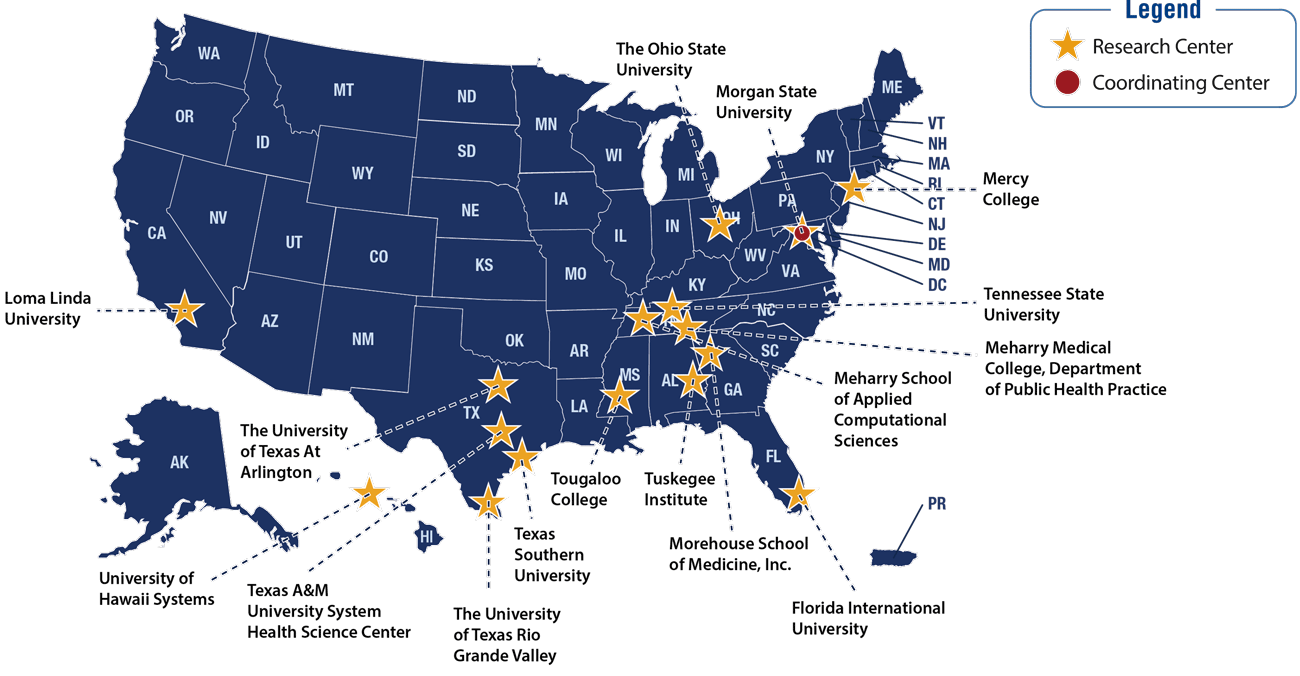In 2023, we launched a maternal health research collaborative. Through studies and methods, we aim to:
- Better understand maternal health disparities and how to address them
- Build the skills of MSIs to conduct this research
- Find community-based solutions
Who makes up this collaborative?
A coordinating center supports 16 MSIs and one non-MSI research center. View the awards chart to find organizations and amounts HRSA invested.

Map of the United States, including Alaska, Hawaii, and Puerto Rico, showing Geographic Distribution of Grantees. 16 research centers are shown: Loma Linda University (California); University of Hawaii Systems; The University of Texas at Arlington; Texas A&M University System Health Science Center; The Unverisity of Texas Rio Grande Valley; Texas Southern University; Tougaloo College (Mississippi); Tuskegee Institute (Alabama); Morehouse School of Medicine, Incorporated (Georgia); Florida International University; Meharry School of Applied Computational Sciences (Tennessee); Meharry Medical College, Department of Public Health Practice (Tennessee); Tennessee State University; The Ohio State University; Morgan State University (Maryland); Mercy College (New York). A Coordinating Center is located at Morgan State University, Maryland.
What is an MSI?
An MSI is a higher educational institution that serves a large percentage of underrepresented or disadvantaged students.
Why are MSIs qualified to conduct these studies?
MSI researchers are part of communities that face maternal health disparities. This gives them:
- Cultural competence: They have a deeper understanding of a community’s cultural values and traditions.
- Trust and credibility: When they’re part of a community, the community is more likely to trust them, join in research, and share information.
- Contextual insight: Having close ties to a community, MSI researchers bring insights about the local history, context, and dynamics. This helps them with framing research questions, explaining findings, and making recommendations.
How is a research collaborative different from a research network?
MCHB research networks fund one grantee. The grantee then works with other institutions on a particular study topic.
In a research collaborative, we fund multiple research centers and a Coordinating Center at Morgan State University in Maryland. The Coordinating Center helps build the capacity of the research centers to conduct the research.
How does the Coordinating Center support the other research centers?
The Coordinating Center:
- Supports research by helping the research centers conduct their studies. It helps each center create a maternal health research center at their institution.
- Mentors the next generation of maternal health researchers at MSIs.
- Builds capacity by
- Creating a learning community for MSIs to share best practices
- Offering education activities to help MSIs conduct research and compete for funding
- Organizing steering committee and in-person meetings
Why focus on maternal health disparities?
There are racial and ethnic disparities in maternal deaths and serious maternal illness. According to the Centers for Disease Control and Prevention, Non-Hispanic Native Hawaiian and Pacific Islander, Black, and American Indian/Alaska Native women are at least two to four times as likely to die from pregnancy-related causes as non-Hispanic White women.
What topics will the research focus on?
Each research institution will study an aspect of maternal health that’s important to their local community. These may include:
- Workforce shortages and solutions
- Care models focused on preventing serious maternal illness and deaths
- Preventing serious maternal cardiovascular illness
- Behavioral health, mental health, and social risk factors
Search the funded research projects database to view awarded grantees’ proposals.
What approaches will the research teams take?
They’re expected to:
- Engage communities in all aspects of the research
- Train new and early career researchers to conduct maternal health research
- Improve the early career researchers’ ability to conduct health disparities research
- Complete a research project on maternal health disparities
- Develop community solutions to address the disparities
- Publish the research findings and translate them into practice
They may use tech technologies in their studies, including:
- Predictive modeling: Uses statistical and computer modeling methods, based on historical data and patterns, to predict future health outcomes or trends
- Mobile applications: Use existing phone applications or create new ones
- Virtual learning platforms: Offer education through online systems and software
How will you use these studies to improve programs and services?
We’ll use these studies to increase the number of researchers from underserved communities we train in maternal health disparity research.